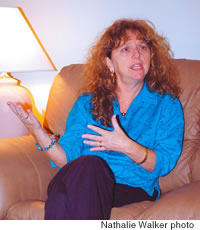A Safe Haven For War Vets
As director of the Honolulu Vet Center, Steve Molnar and his staff offer free counseling for veterans returning home from war and provide a safe haven for those suffering from post-traumatic stress

By .(JavaScript must be enabled to view this email address)
E-mail this story | Print this page | Archive | RSS |
 Del.icio.us
Del.icio.us
Matthew Handel specializes in counseling people
coming back from the war in Iraq
“Those people were mainly angry, depressed and confused,” Molnar says. “Remember that our country was torn apart then.”
In the ‘80s, World War II and Korea vets were added as eligible for the free help. Molnar says “we’ve even had older guys who stormed Normandy or took Cassino, but don’t hear well and get frustrated by those voice-mail messages to press this or that button.”
In 1996, Congress authorized all war veterans to use the centers. Molnar says: “Now, more people want to work out their issues. They’re not so angry. Not like Vietnam. But they’re bothered by other things - crowds, dreams, not getting along with a spouse.”
Matthew Handel was brought on board because he’s young (the newer vets can better identify with him) and an Iraq vet of the 3rd Infantry Division. He’s the one who’s sent out to meet the Hawaii military people returning from Iraq and Afghanistan.
Ann Fisher counsels on sexual trauma. Yes, both women and men come to her with stories of violent sexual attacks on them while in the military.
The Iraq/Afghanistan vets are just starting to trickle in. They’re just learning what others learned - that people you know and meet will ask you a lot of war questions you don’t want to answer.

As a veteran of the Vietnam War, Steve Molnar
can empathize with vet center clients
The Honolulu Vet Center is a one-stop shop. You don’t need to have PTSD to get in. You can ask for help with medical questions, employment opportunities or bereavement issues. Actually, any vet can walk into the office at 1680 Kapiolani Blvd. (adjacent to 24-Hour Fitness) and have a cup of coffee or read a magazine. You can ask for one-on-one counseling or join a group session on life skills, combat and POW issues, or even the weekly meditation with an outside teacher.
The Doonesbury counselor said the service is free. That’s true, sort of. Vet Centers are supported by tax money - even a veteran’s tax money.
One thing that markedly changed over the years is cognizance of that term PTSD. WWII vets only knew it as shell shock or going combat crazy.
“Today, returning vets may tend to be fearful, saying ‘What if I have PTSD?’ and ‘Will I have bad dreams?’” Molnar says. “We tell them some do and some don’t. It’s like lung cancer. I know people who got lung cancer and they never smoked,” he says.
You read lots of pro and con opinion on PTSD and whether it’s real or imagined. The nationally recognized Sidran Institute says this:
“Many people who experience an extremely traumatic event go through an adjustment period following the exposure. Most of these people are able to return to leading a normal life. However, the stress caused by trauma can affect all aspects of a person’s life including mental, emotional and physical well-being. Research suggests that prolonged trauma may disrupt and alter brain chemistry. For some people, a traumatic event changes their views about themselves and the world around them.”
The Internet seems to be all-providing these days, and it’s no surprise that a Dr. John Grohol runs something billed as Psych Central online.
As horrified as professionals might be to find somebody offering psychological counseling online, Grohol’s site for disturbed veterans says simply to “learn about the specialized therapies available at Vet Centers and VA Medical Centers.”
That will bring a smile to Steve Molnar’s face.

Ann Fisher is a LCSW sexual trauma
counselor at the vet center
He, as well as counselors on Maui and Kauai and in Hilo and Kona on the Big Island, have seen the best and the worst of vets. Many years ago, Molnar’s people helped me make contact with unhappy Big Island vets of the Vietnam war for a documentary series I did for KGMBTV.
The best lived near KailuaKona and collected disability checks. The worst defied visitors and police, lived at the 4,000 foot level on Hualalei with guns, and considered me - or the police - to be the enemy. Many lived in the Puna rain forest as if they were still recon soldiers on patrol. One’s wife gave me an interview - her husband was “out on patrol.” A few weeks later, he walked into Pahoa, walked in front of a truck and killed himself.
I interviewed many unhinged vets in Pahoa one day but ran out of videotape. A vet who insisted on being interviewed pulled a .45 automatic from his waist-band, racked the slide, held the gun on me and ordered me to interview him.
Other vets persuaded him not to shoot.
That’s the extreme, and some of those people probably need psychiatric help. But most just need a little readjustment work.
Molnar and his counselors hope this MidWeek story will help bring more of them in.
INFO BOX:
Steve Molnar’s tips to returning vets:
* Don’t obsess over televised news reports.
* Don’t withdraw or isolate.
* Reach out to others when you feel overwhelmed.
* The Honolulu Vet Center offers free, confidential counseling services for veterans and families. Call 808-973-VETS.
Page 2 of 2 pages for this story < 1 2
E-mail this story | Print this page | Comments (0) | Archive | RSS
Most Recent Comment(s):








